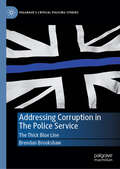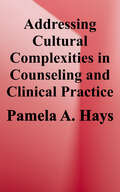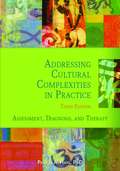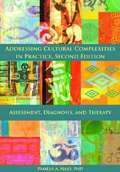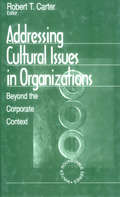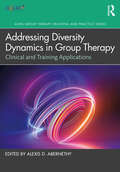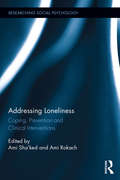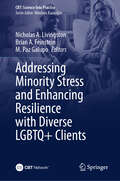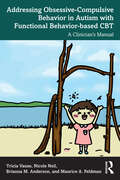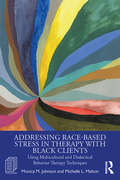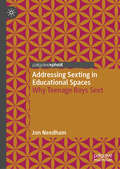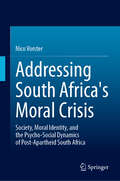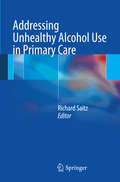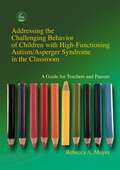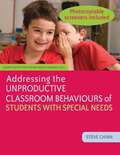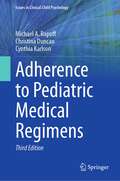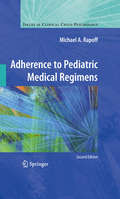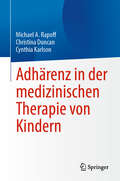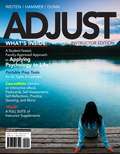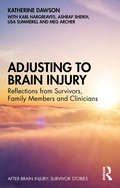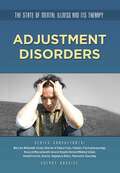- Table View
- List View
Addressing Climate Change in Local Water Agency Plans: Demonstrating a Simplified Robust Decision Making Approach in the California Sierra Foothills
by David G. Groves Evan Bloom David R. Johnson David Yates Vishal MehtaThis report describes an approach for planning under deep uncertainty, Robust Decision Making (RDM), and demonstrates its use by the El Dorado Irrigation District (EID). Using RDM, the authors and EID tested the robustness of current long-term water management plans and more robust alternatives across more than 50 futures reflecting different assumptions about future climate, urban growth, and the availability of important new supplies.
Addressing Corruption in The Police Service: The Thick Blue Line (Palgrave's Critical Policing Studies)
by Brendan BrookshawThis book offers an autoethnographic examination of the author's last three years as a serving police officer and as Head of the Professional Standards Department, recorded in personal journals. It analyses the emotional and philosophical impact arising from day-to-day interactions with police officers and reflects on corruption and how it is perceived both inside and outside the service. This book posits a model of the kakistocratic police milieu as a theoretical framework for analysis of the police in contemporary neoliberal liquid modernity which could be used to explore other police phenomenological research data. This autoethnographic insider research provides a rare addition to the knowledge on police corruption. It speaks in particular to those doing professional policing degrees and police practitioners.
Addressing Cultural Complexities in Counseling and Clinical Practice: An Intersectional Approach
by Pamela A. HaysThe author's popular bestseller invites readers to move beyond a one-dimensional view of identity to a nuanced understanding of the overlapping cultural influences that affect us all. This fourth edition's new chapters feature culturally adapted cognitive behavioral tools and techniques, and trauma due to racism and other systemic forms of oppression. It remains richly illustrated with case material, with many new vignettes and examples demonstrating the ADDRESSING framework in both counseling and clinical practice. Other new material includes updated discussion of gender identity, with attention to clinically relevant research regarding transgender and nonbinary people, more on people with disabilities (the largest minority group in the U.S.), the latest terminology and language regarding diverse minority groups, and a special section on social justice and its relationship to therapeutic practice. In an increasingly diverse society, mental health providers must be able to work effectively with a wide variety of clients. The ADDRESSING framework shows clinicians and counselors how to take into account age and generational influences, developmental or other disability, religion and spirituality, ethnic and racial identity, Indigenous heritage, national origin, socioeconomic status, sexual orientation, and gender. Each chapter includes Key Ideas summaries and practice exercises, making this book ideal for personal, educational, or group use.
Addressing Cultural Complexities in Practice: Assessment, Diagnosis, and Therapy
by Pamela A. HaysIn an increasingly diverse society, psychotherapists must be able to work effectively with a wide variety of clients, each of whom has been shaped by a different mix of cultural and social influences. Pamela Hays' popular bestseller invites readers to move beyond a one-dimensional view of identity to a nuanced understanding of the factors that enable therapist and client to interact productively.
Addressing Cultural Complexities in Practice: Assessment, Diagnosis, and Therapy (Second Edition)
by Pamela A. HaysMeant for counsellors, clinicians, and mental health professionals, the author helps therapists recognise and understand the cultural influences which define and drive each of us.
Addressing Cultural Issues in Organizations: Beyond the Corporate Context
by Robert T. CarterAnalyzing how unexamined cultural patterns influence an organization's culture, this book provides conceptual models and ideas about how to build practical approaches to organizational interventions. The contributors focus on the broad issues such as how organizational leaders shape and influence the agenda surrounding culture; cover institutional and organizational issues in corporate, educational, mental health, and service organizations; and discuss various organizational intervention strategies and approaches.
Addressing Diversity Dynamics in Group Therapy: Clinical and Training Applications (AGPA Group Therapy Training and Practice Series)
by Alexis D. AbernethyThis book illustrates group dynamics and group interventions in response to diversity-related content and processes in group therapy.Perspectives informed by conceptual frameworks guide the discussion of specific clinical interventions and the implications for training. Cultural dimensions of race, international heritage, classism, religion, and aspects of intersectionality associated with these dimensions are a particular emphasis. Key sections for each chapter include Conceptual Framework, Group Interventions, Teaching or Case Examples, Intersectionality, Ethical Considerations, and Implications for Training and/or Practice. Professional development opportunities for mental health professionals as well as training implications for psychiatry residents and psychology interns is addressed, and case studies offer practical examples for guiding therapists and trainees to intervene more effectively in addressing diversity dynamics in group therapy.An important and timely resource that belongs in every group practitioner’s repertoire, this resource is broad enough to be integrated into a course for a training or graduate program and specific enough to serve as a shelf reference for those in practice.
Addressing Loneliness: Coping, Prevention and Clinical Interventions (Researching Social Psychology)
by Ami Sha'Ked Ami RokachThis is a volume on loneliness and what can be done to address its pain. While most books simply describe loneliness from one author’s point of view, this volume includes a comprehensive review of the literature and employs top researchers in the field discuss their own research findings, conclusions and clinical experience. It explores the relationship between loneliness and sexuality, loneliness and optimism, and parental loneliness during pregnancy and childbirth. It also addresses loneliness throughout the life cycle in children, adolescents, the elderly and disabled, leading to a variety of coping and therapeutic modalities aimed at helping those who suffer from loneliness in its various forms.
Addressing Minority Stress and Enhancing Resilience with Diverse LGBTQ+ Clients (CBT: Science Into Practice)
by Nicholas A. Livingston Brian A. Feinstein M. Paz GalupoThis volume brings together cutting-edge work of LGBTQ+ health experts and master clinicians on the forefront of treatment development, adaptation, and implementation. It is designed for clinicians, educators, students, and researchers who want to implement LGBTQ+ affirming practices today. Every chapter includes rich case examples, clinical dialogue, and lessons learned, with particular attention to under-represented topics (e.g., person-centered assessment, co-occurring trauma and minority stress) and groups (e.g., Black, Indigenous, and People of Color, veterans, older adults, people with disabilities).
Addressing Obsessive-Compulsive Behavior in Autism with Functional Behavior-based CBT: A Clinician's Manual
by Tricia Vause Maurice A. Feldman Brianna M. Anderson Nicole NeilThe Clinician’s Manual and its accompanying workbook, I Believe in Me, Not OCB! are the first known manuals to combine cognitive behavioral therapy and applied behavior analysis to treat obsessive-compulsive behavior (OCB) in children and youth with autism. The Clinician’s Manual serves as a practical guide for therapists, beginning with chapters that explain the theoretical underpinnings of OCBs, adaptations for autism, and guidance on clinical and functional behavioral assessment that are key to administering the nine treatment sessions that follow. Our evidence-based treatment incorporates functional behavioral assessment, CBT skills training, caregiver coaching, and social skills activities in a nine-week progressive program. Caregiver and child report data inform progress throughout the program. Generalization and maintenance are promoted through weekly caregiver coaching modules. Treatment can be delivered in a group or individual format and focuses on reducing OCBs with the ultimate goal of increasing quality of life. The manual provides all clinician, child, and caregiver instructions as well as materials to implement functional behavior-based CBT with precision. These manuals are a vital resource for clinicians working with autistic children and youth and their families.
Addressing Race-Based Stress in Therapy with Black Clients: Using Multicultural and Dialectical Behavior Therapy Techniques
by Monica M. Johnson Michelle L. MeltonDespite Black Americans being at high risk for negative mental health symptoms due to racism and other chronic stresses, disparities persist in the provision of mental health services to this population. This book addresses that gap in clinical practice by explicitly calling attention to the experience of race-based stress in the Black community. Johnson and Melton urge mental health practitioners to action in promoting societal understanding, affirmation, and appreciation of multiculturalism against the damaging effects of individual, institutional, and societal racism, prejudice, and all forms of oppression based on stereotyping and discrimination. Chapters include worksheets, vignettes, and case studies to provide a practical framework for implementing an effective, nonpathological approach to ameliorating the damaging effects of race-based trauma and stress. This book will give tools and strategies for mental health professionals to responsibly use scientific and professional knowledge to improve the condition of individuals, communities, and, by extension, society.
Addressing Sexting in Educational Spaces: Why Teenage Boys Sext (Studies in Childhood and Youth)
by Jon NeedhamThis book highlights the findings from the largest study of its kind undertaken in the United Kingdom that investigated the behaviours, of teenage boys, as they reflect on the extent and motivations associated with the sending and receiving of self-generated sexual images and messages (sexting). Based on a cross-sectional research study that examined the sexting behaviour data of boys 14-18, this book allows the voice of the teenagers to be heard alongside the interpretation and consideration of qualitative data collected from the study and semi-structured interviews. The book attempts to answer questions surrounding the prevalence of adolescent practice and the intersection between the individual and the contextual elements of sexting that effect motivation. Dr Needham examines the relationship between behaviour and sexual identity and the impact of age, ethnicity, relationships, pornography, and faith. The recommendations suggested challenge curriculum, policy and practice development relating to how teenage sexting is framed and proposes a new approach with a sexting typology that addresses the &‘why&’ behind the motivation to sext, rather than just examining the &‘what&’ of message content.
Addressing South Africa's Moral Crisis: Society, Moral Identity, and the Psycho-Social Dynamics of Post-Apartheid South Africa
by Nico VorsterThis book attempts to understand and address the psycho-social dynamics behind South Africa&’s moral crisis. It describes South Africa as afflicted by state capture, violence, corruption, and the looting of state infrastructure thirty years after the establishment of democracy. It then provides a holistic, social diagnosis of this problem that integrates the findings of different disciplines into an overall picture of the forces at work in South Africa's collective moral decline. Ultimately, this book engages with the deeper psycho-social phenomena behind South Africa&’s moral decline, arguing that the diagnostic question of why this moral decline has taken place must be answered before turning to the normative question of what ought to happen in this situation. Accordingly, this book explores themes regarding the innate moral capacities of the human person, the effects of need pressures and systemic pressures on ethical decision-making, and the phenomena of distorted motivational drives and distorted behavioral responses. It shows how the framing of virtue-centered moral identities might act as buffers against moral disengagement strategies and assist in promoting pro-social behavior. It then specifies the macro-social changes required to create such an ethical-social climate. The book is of interest to social scientists, ethicists, behavioral scientists, educators, theologians, and moral philosophers. In the end, this case study of South Africa shows us more broadly how maintaining public morality and social cohesion is a challenge that most modern societies face.
Addressing Unhealthy Alcohol Use in Primary Care
by Richard SaitzWhile there is a wealth of published information on addiction medicine, the psychological aspects of alcohol abuse, and behavioral medicine with regard to addiction, virtually none of these resources were written with the primary care provider in mind. Addressing Unhealthy Alcohol Use in Primary Care is a resource for primary care clinicians who are confronted by patients with these problems daily, and who wish to successfully address these issues in their practice. It would focus on the literature and science relevant to primary care practice and cover the range of interventions appropriate for this setting. Topics include assessment, brief counseling interventions, pharmacotherapy, referrals to both specialty care and Alcoholics Anonymous (and other self-help programs), psychiatric co-morbidity and other drug use, and other information specific to the needs of the primary care provider.
Addressing Violent Radicalisation and Extremism: A Restorative Justice & Psychosocial Approach
by Theo GavrielidesThis book adopts an interdisciplinary approach to confront one of the most urgent global challenges of our time violent radicalisation and extremism. It critically examines how restorative justice, positive criminology, and positive psychology intersect to address the behaviors and social conditions that foster extremism, offering a framework that reflects the complexities of our era. Grounded in a synthesis of philosophical inquiry, normative analysis, and empirical evidence from six international pilot projects conducted between 2017 and 2024, the volume navigates the shifting boundaries between punitive and preventive approaches. It explores the potential of community-based initiatives to foster understanding, empathy, and empowerment as means to reduce violence and promote reconciliation. Through a focus on the psychological and social roots of extremism, the book delves into the restorative capacity of justice systems to mend fractured communities and the role of positive psychological interventions in reshaping harmful behaviors. In doing so, it bridges theoretical advancements with actionable strategies for policymakers, practitioners, and researchers seeking alternatives to traditional punitive models. This collection reflects the depth and breadth of contemporary scholarship in counter-extremism, offering perspectives from established experts and emerging voices. It serves as a vital resource for those engaged in fields such as social work, human rights, conflict resolution, and criminology, contributing fresh insights and practical tools to prevent and mitigate radicalisation. &“This book offers a refreshing and holistic perspective on one of the most pressing global issues today violent extremism. By integrating restorative justice principles with a psychosocial approach, the book moves beyond punitive measures and focuses on healing, rehabilitation, and the reintegration of individuals into society. This book is a thought-provoking and important contribution to the discourse on counter-extremism&”.<span lang="EN-GB" style="font-size: 12.0pt; font-family: 'Times New Roman',serif; mso-fare
Addressing the Challenging Behavior of Children with High-Functioning Autism/Asperger Syndrome in the Classroom: A Guide for Teachers and Parents
by Rebecca MoyesHow do teachers and parents of children with autism address a child's social skills? And what do they do about problem behaviors? This book provides possible explanations for these behaviours, and a wealth of practical help for both teachers and parents to address them. Teachers learn how to create environmental supports and how to incorporate specific teaching strategies. Students with autism learn the new skills they might need, and ways of making their behavior more acceptable. This book is full of practical tips on how to tackle different kinds of challenging behaviors both in the classroom and outside it.
Addressing the Unproductive Classroom Behaviours of Students with Special Needs
by Steve Chinn*Shortlisted for the 2011 NASEN Award 'Book to Promote Professional Development'*Certain classroom behaviours can signify an underlying learning disability. This book will help you recognise potential indicators of Asperger Syndrome, dyslexia, dyspraxia, AD/HD, physical disabilities and speech and language disorders; explores the benefits of different interventions; and offers practical strategies for improving pupils' behaviours, social skills and self-esteem. This book contains:- A simple-to-use screener for initial identification of a pupil's specific learning disability- A practical and simple structure for monitoring classroom behaviours and creating an Individual Behaviour Plan- Tried-and-tested teacher strategies for common areas of concern, such as problems staying on task, inability to work on group tasks and failure to seek help when needed- Key educational theories to help teachers understand and influence classroom behaviours, and further develop classroom management skills for addressing the behaviours of special needs pupils. This practical, accessible book is an essential tool kit for special educational needs coordinators, learning support staff and teachers in both primary and secondary schools.
Adherence to Antipsychotics in Schizophrenia
by Emilio Sacchetti Antonio Vita Alberto Siracusano Wolfgang FleischhackerPoor adherence to therapy is one of the main obstacles to treatment effectiveness in schizophrenia. It is the main determinant of relapse, hospitalization, symptom persistence, and poor psychosocial functioning and outcome. Adherence to treatment is affected by various factors related to the disease characteristics, to the patient him- or herself, to the treatment, and to the therapeutic relationship. Some of these factors are modifiable, and both pharmacological and non-pharmacological strategies have been developed for this purpose. This book addresses the different aspects of adherence to treatment in schizophrenia and related disorders in a systematic but easy-to-use manual format. Chapters focus on a full range of issues, including pharmacological and non-pharmacological strategies to enhance adherence and continuity of care, relevant psychological factors, the importance of the patient-doctor relationship, and the need for an alliance with other care-givers. Adherence to Antipsychotics in Schizophrenia will be an invaluable asset for all who are involved in the care of patients with schizophrenia.
Adherence to Pediatric Medical Regimens (Issues in Clinical Child Psychology)
by Michael A. Rapoff Christina Duncan Cynthia KarlsonThe third edition of this book provides comprehensive coverage of pediatric medical adherence, including such important topics as the extent of nonadherence and medical consequences, predictors of adherence, theories about adherence and clinical applications, and assessment strategies for adherence and health outcomes. In addition, chapters describe strategies for improving adherence, review research studies on improving adherence, and address ways to improve research on adherence for children and adolescents with chronic diseases. The new edition also examines the developmental aspects of adherence assessment and intervention as well as cultural, ethical, and legal issues in adherence research and practice. Key areas of coverage include: Consequences of nonadherence and correlates of adherence. Developmental aspects related to assessing and improving pediatric medical adherence. Assessing pediatric disease and health status. Cultural, ethical, and legal issues related to pediatric medical adherence. Adherence to Pediatric Medical Regimens, Third Edition, is an essential reference for researchers, professors, and graduate students as well as clinicians, therapists, and other practitioners in developmental, clinical child and school psychology, child and adolescent psychiatry, pediatrics and pediatric psychology, social work, public health, health psychology, and all interrelated fields.
Adherence to Pediatric Medical Regimens (Issues in Clinical Child Psychology)
by Michael A. RapoffIt used to be called noncompliance, and the patients themselves referred to as difficult. But regardless of the terminology, children's reluctance or failure to commit to prescribed regimens reduces the effectiveness of treatment, often leading to additional care, higher costs, and serious, even deadly, complications. Reflecting a single, authoritative voice, the Second Edition of Adherence to Pediatric Medical Regimens analyzes in comprehensive clinical detail the factors that affect children's and teens' commitment to treatment - from developmental issues to the influence of parents, peers, and others in their orbit - and offers empirically sound guidelines for encouraging adherence. It cautions against viewing young clients as miniature grownups or scaling down adult data, advocating instead for a more nuanced understanding of the population and a collaborative relationship between practitioner and client. Critical areas of interest to clinicians and researchers in pediatrics are brought into clear focus as the book: Provides an overview of adherence rates to chronic and acute disease regimens and examines common adherence problems in children and adolescents. Details consequences of nonadherence and correlates of adherence. Critiques major adherence theories and their clinical implications. Discusses the range of adherence assessment measures. Reviews educational, behavioral and other strategies for improving adherence. Offers ways to translate research into pediatric medical adherence. This updated edition of Adherence to Pediatric Medical Regimens is an essential reference for anyone concerned with improving health outcomes in young people, especially clinicians, researchers, and graduate students in psychiatry as well as pediatric, clinical child, and health psychology.
Adhärenz in der medizinischen Therapie von Kindern
by Michael A. Rapoff Christina Duncan Cynthia KarlsonDieses Buches bietet eine umfassende Abdeckung der pädiatrischen medizinischen Einhaltung, einschließlich wichtiger Themen wie das Ausmaß der Nichteinhaltung und deren medizinische Konsequenzen, Prädiktoren der Einhaltung, Theorien zur Einhaltung und klinische Anwendungen sowie Bewertungsstrategien für Einhaltung und Gesundheitsergebnisse. Darüber hinaus beschreiben die Kapitel Strategien zur Verbesserung der Einhaltung, überprüfen Forschungsstudien zur Verbesserung der Einhaltung und behandeln Möglichkeiten zur Verbesserung der Forschung zur Einhaltung bei Kindern und Jugendlichen mit chronischen Krankheiten. Die neue Auflage untersucht auch die Entwicklungsaspekte der Bewertung und Intervention zur Einhaltung sowie kulturelle, ethische und rechtliche Fragen in der Forschung und Praxis zur Einhaltung. Wichtige Themen sind: Konsequenzen der Nichteinhaltung und Korrelate der Einhaltung. Entwicklungsaspekte im Zusammenhang mit der Bewertung und Verbesserung der pädiatrischen medizinischen Einhaltung. Bewertung von pädiatrischen Erkrankungen und Gesundheitszuständen. Kulturelle, ethische und rechtliche Fragen im Zusammenhang mit der pädiatrischen medizinischen Einhaltung. Einhaltung pädiatrischer medizinischer Regime ist ein unverzichtbares Nachschlagewerk für Forscher, Professoren und Doktoranden sowie für Kliniker, Therapeuten und andere Fachkräfte in der Entwicklungs-, klinischen Kinder- und Schulpsychologie, Kinder- und Jugendpsychiatrie, Pädiatrie und pädiatrischer Psychologie, Sozialarbeit, Public Health, Gesundheitspsychologie und allen verwandten Bereichen.
Adicta a un gilipollas: Supera tu adicción emocional a una relación tóxica
by Lara FerreiroUn programa de desintoxicación radical en seis semanas para liberarte de tu adicción emocional.¿Crees que tal vez seas adicta a un hombre tóxico? ¿Acabas siempre enganchada al mismo perfil de gilipollas? ¿Repites patrones tóxicos en tus relaciones? ¿Quieres aprender a detectar y evitar esos comportamientos? ¿Te gustaría reforzar tu amor propio y construir una relación sana de pareja?Lara Ferreiro,psicólogade referenciaen España, ha formulado un método pionero que te ayudará a desengancharte de una relación tóxica. Este libro incluye:* un «yonquitest» para que conozcas tu grado de adicción emocional,* historiasde otras mujeres que pasaron por la misma situación que tú y la superaron, * los diez perfiles de adictas emocionales más comunes para que descubras tu rueda adicta,* el «top 10 de gilipollas» con los perfiles de hombres tóxicos más habituales,* un programa de desintoxicación radical de seis semanas para desengancharte de tu relación tóxica.A lo largo de estas páginas aprenderás a no permitir que nadie te maltrate, a valorarte, a quererte incondicionalmente, a sanar tus heridas emocionales y a sentirte digna de amor y merecimiento. Despierta a la mujer fuerte y empoderada que llevas dentro. Este libro es el primer paso hacia tu nueva vida.
Adjust: Applying Psychology to Life
by Wayne Weiten Dana S. Dunn Elizabeth Yost HammerCreated through a 'student-tested, faculty-approved' review process, ADJUST is an engaging and accessible solution to accommodate the diverse lifestyles of today's learners. ADJUST employs balanced psychological research coverage, engaging applications, and current examples to help readers understand themselves and the world.
Adjusting to Brain Injury: Reflections from Survivors, Family Members and Clinicians (After Brain Injury: Survivor Stories)
by Katherine Dawson Ashraf Sheikh Karl Hargreaves Meg Archer Lisa SummerillThis important book in the After Brain Injury: Survivor Stories Series tells the story of four people who suffered acquired brain injuries: Karl Hargreaves and Ashraf Sheikh as a result of road traffic accidents, Lisa Summerill because of a stroke and Meg Archer as a result of meningitis. Each person tells their story in their own words, describing what happened to them, how they dealt with it and how they experienced the recovery process. The cases represent very different types of people and severity of injury but are alike in providing raw accounts of the challenges faced whilst also highlighting their resilience and determination to carve out new lives. Alongside these inspirational stories are contributions by friends and family, as well as several members of the interdisciplinary rehabilitation team to give a broader view of the whole process of recovery. By combining expert commentary with real life experiences, this book points towards sources of support, normalises the experience and provides a context for understanding the challenges and successes in each case. This book provides support, understanding and hope for patients who have suffered a brain injury. It is valuable reading for any professional involved in neurorehabilitation and students of clinical neuropsychology.
Adjustment Disorders (The State of Mental Illness and Its Ther #19)
by Sherry BonniceWe all have to deal with stress sometimes. Learning to balance our many responsibilities, adjust to new situations, and handle multiple stresses is part of life. But does this mean that you should feel stressed all the time? What if you always feel overwhelmed? What if you simply can't adjust to a new challenge or situation? When the normal challenges of life cause such extreme emotional turmoil that a person cannot adapt and react appropriately, he may be suffering from an adjustment disorder. Those who suffer from adjustment disorders find it particularly difficult to adapt and function in their daily environments. Perhaps they are dealing with a loss or change in life, such as divorce, moving, a new baby, or an end to a relationship. Perhaps they overreact to minor stresses or have anxiety, depression, or conduct disorders that interrupt their normal life functions. When their inability to cope becomes a mental illness, people need help from medical professionals to gain control of their lives again. In Adjustment Disorders, you will learn about the antidepressants and anti-anxiety drugs available to treat adjustment disorders. Along the way, you will read about the history of psychiatric drugs, how they work, and current treatment methods. You will also read valuable information about what to expect when taking psychiatric drugs, as well as some of the most prevalent alternatives to drug treatment. Sharing the experiences of young people as they cope with divorce, disappointment, moving, depression, and anxiety may help you understand how such changes can affect your life as well...and where to turn if your reactions to these changes get out of control.

